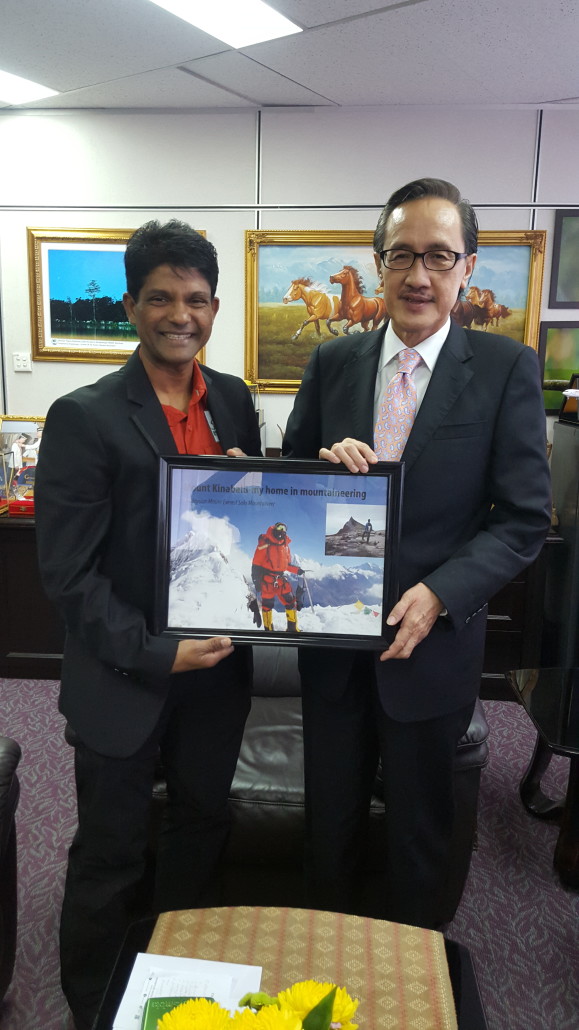jessica2016-02-26T15:26:09+08:00Kota Kinabalu: Chief Minister Datuk Seri Panglima Musa Haji Aman said more documentaries should be made to showcase Sabah's unique biodiversity, natural attractions and rich cultural heritage to the world.
He said Sabah has so much to offer and one way of communicating its diverse natural and cultural attractions was through documentaries.
"I therefore urge more people especially young to delve into the creative industry of film production including documentaries as well as other commercialisation of works of arts," he said, at the Kota Kinabalu Premiere of "Into The Wild of Borneo" at a leading shopping mall here on Monday.
The documentary film featuring Sabah's natural beauty and diversity was co-produced by Paris-based F-Productions and University College Sabah Foundation (UCSF).
Musa also said he was pleased that UCSF has set one of its goals to promote the development of both the creative and tourism industries in Sabah.
"As you know tourism is an important economic catalyst for the State. As a learning institution, you must encourage your creative faculty to tap into ways to promote Sabah to the global market," he said.
He, therefore, commended UCSF led by its Vice Chancellor Prof Datuk Dr Ghazally Ismail on the collaborative effort.
Meanwhile, University College Sabah Foundation (UCSF) became the first university in the State to capture the wonders of Sabah's flora and fauna through a world-class documentary film, 'Into the Wild of Borneo'.
The 55-minute long nature documentary was brought into fruition in collaboration with Paris based F-Productions and Mapuche Production, and premiered at the Imago Mall MBO Cinema on Monday.
Also present were Community Development and Consumer Affairs Minister Datuk Jainab Ahmad, Deputy Education Minister Datuk Mary Yap, Yayasan Sabah Director Datuk Sapawi Ahmad, UCSF Vice Chancellor Prof Datuk Dr Ghazally Ismail, and the film director Jorge Camilo Valenzuela.
The Memorandum of Agreement for this collaborative joint venture was signed in the presence of Musa in Paris last year. Meanwhile, Dr Ghazally said the production of the film is part of their ongoing efforts to serve in the development of human capital for the State.
"… being a new university, we ought to build ourselves from the strength of Sabah. There are many ways that a new university can contribute to the State and we have decided to strive in the tourism and film making industries.
"As you can see, we have involved our students in the production work of the documentary and its international marketing which eventually would boost the tourism industry especially if the film were to be shown in bigger occasions such as a film festival or even on National Geographic."
He also said through the selling of the film, UCSF would like to reduce its dependency on the Government.
"We want to be not totally dependent on the support by the Government as we are always encouraged to be independent.
"Therefore, by pursuing the film-making industry, we could render ourselves to be financially independent because the market for documentary films is in demand.
"It will be a permanent asset or intellectual property for the university to generate income in the future," he said.
At the same time, the film director, Valenzuela said, filming the documentary was delightful and that he had a fun time sharing his experience with the students.
"It was more like a knowledge sharing process and it is still on going. Even before the filming started, I've taught the students on how to produce a film, and five of the best students were selected to be part of the filming team," he said.
He said the film took them four months to complete; two months to film and another two months to edit.
"We filmed for two months in Kinabatangan and another two months was for post-production editing at our studio in Paris," he said.
To a question on peculiar experiences while filming, he said a drone was broken and the process of getting a new drone was tedious.
"We broke a drone while filming, but in order to get a new one, I had to hop on a lot of flights to get back to Paris, get a new drone, and back to Sabah again," he said.
Valenzuela has 12 years' experience in wildlife filming and photography, while F-Productions has more than 300 short-films in its portfolio.
Source: Daily Express





